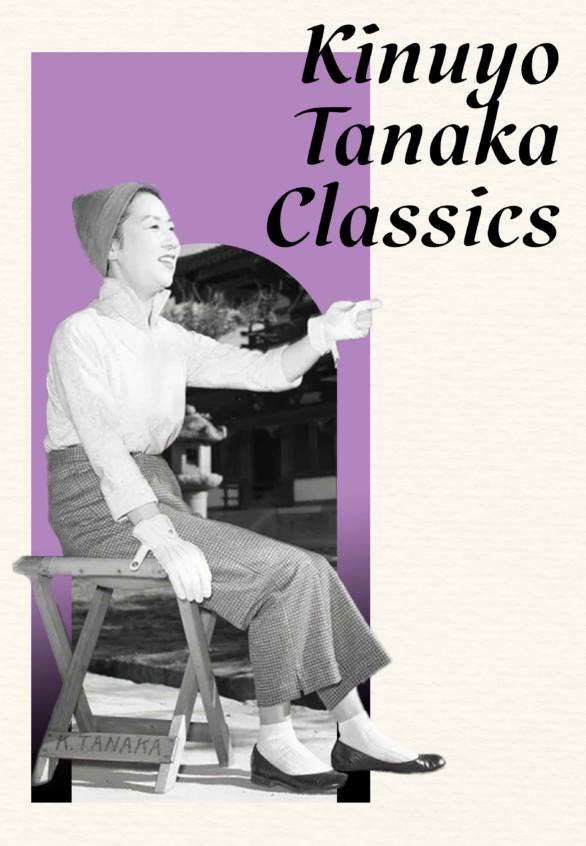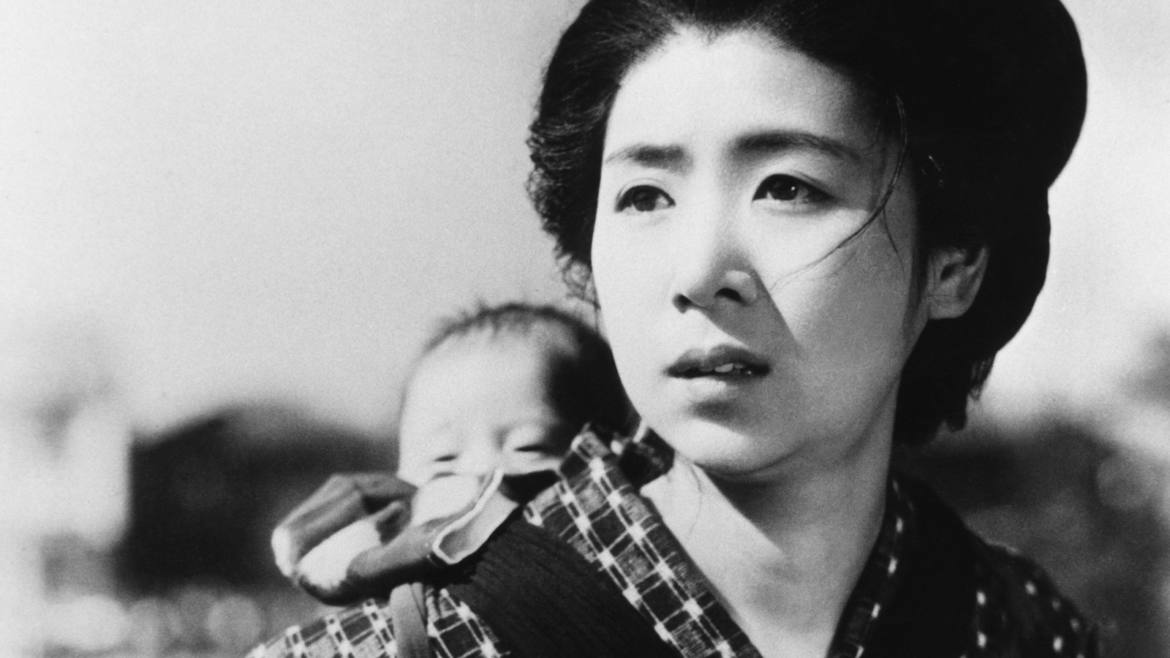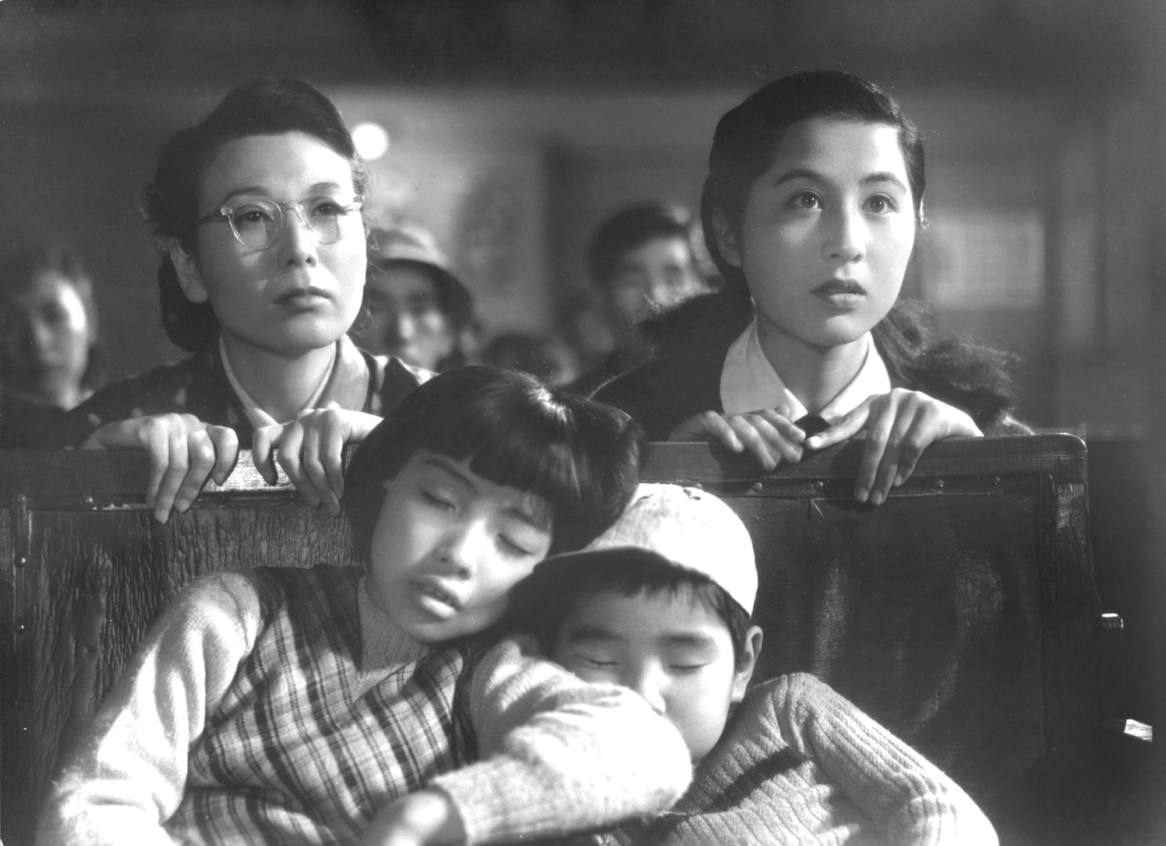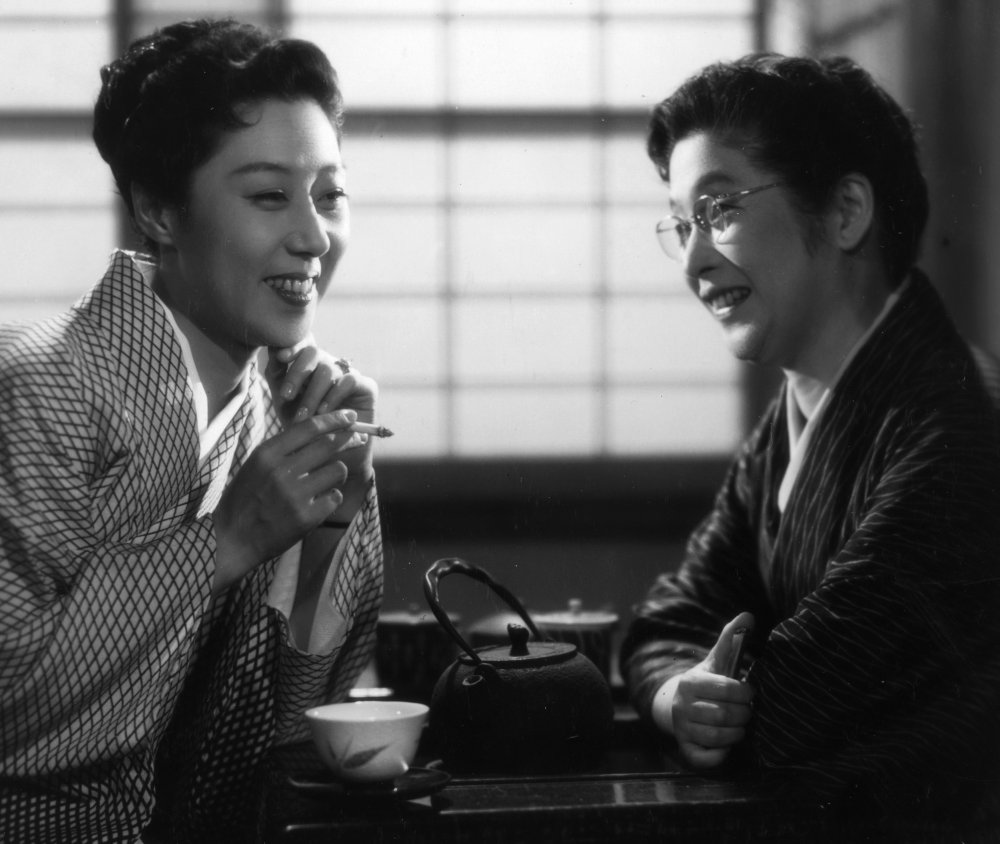Events
Film
05/18/2024 - 07/11/2024
Silver Spring, MD
Kinuyo Tanaka Classics

Time and Location
May 18 – July 11
AFI Silver Theatre (Silver Spring, MD)
About
Expanding on the retrospective of pioneering Japanese filmmaker and actor Kinuyo Tanaka‘s directorial work held at the National Gallery of Art and National Museum of Asian Art earlier this spring, AFI Silver Theatre spotlights Tanaka’s brilliance as an actor with a selection of her most beloved performances in films by Yasujirō Ozu, Kenji Mizoguchi, Mikio Naruse and Keisuke Kinoshita.
Co-presented with the Smithsonian’s National Museum of Asian Art and National Gallery of Art.
For tickets, visit: AFI Silver Theatre and Cultural Center – Kinuyo Tanaka Classics
Full lineup below and at AFI.com/Silver.
4K Restoration
A HEN IN THE WIND [KAZE NO NAKA NO MENDORI] [風の中の牝鶏]
Sat, May 18, 5:00 p.m.; Sun, May 19, 5:00 p.m.; Tue, May 21, 4:45 p.m.; Thurs, May 23, 4:45 p.m.
With its screenplay completed in 1947, THE MOON HAS RISEN was meant to be Yasujirō Ozu’s second film after World War II, but due to a number of production issues — not least the inability to film its story in war-ravaged Tokyo — the project was scrapped for A HEN IN THE WIND, a more immediate comment on the conditions of Japan’s reconstruction period. This rare melodramatic turn from the director follows a mother (Kinuyo Tanaka) who, while waiting for her husband (Shūji Sano) to return from war, resorts to one night of sex work to pay her sick child’s medical bills. The Ozu’s delicate humanism is no less apparent in this genre, but perhaps the driving force of the film’s deep emotional impact is Tanaka, whose elegant and staggeringly honest performance gives clear expression to the domestic troubles faced by Japan’s family unit in the postwar era. (Note courtesy of Film at Lincoln Center.) DIR/SCR Yasujirō Ozu; SCR Ryōsuke Saitō; PROD Mitsuzō Kubo. Japan, 1948, b&w, 84 min. In Japanese with English subtitles. NOT RATED
4K Restoration | 70th Anniversary
SANSHO THE BAILIFF [SANSHO DAYU] [山椒大夫]
Sun, May 26, 4:30 p.m.; Tue, May 28, 4:30 p.m.; Thurs, May 30, 4:30 p.m.
Kenji Mizoguchi’s family saga is epic in sweep but poetic in its consideration of revenge and forgiveness. In medieval Japan, the family of a disgraced aristocrat is dispersed when the father is exiled, the son and daughter are enslaved and the mother (Kinuyo Tanaka) is sold into prostitution. After many years, the grown son assumes his rightful post as provincial governor and sets about deposing the cruel bailiff who brought tragedy upon his family. Winner of the Silver Lion, 1954 Venice Film Festival. DIR Kenji Mizoguchi; SCR Fuji Yahiro and Yoshikata Yoda, from the story by Ôgai Mori; PROD Masaichi Nagata. Japan, 1954, b&w, 124 min. NOT RATED
80th Anniversary
ARMY (1944)[RIKUGUN 陸軍] in 35mm
Sat, June 1, 12:00 p.m.; Sun, June 2, 12:00 p.m.
Keisuke Kinoshita’s ambitious and intensely moving film begins as a multigenerational epic about the military legacy of one Japanese family before settling into an emotionally complex portrayal of parental love during wartime. As the mother and father of a boy shipped off to battle, Kinuyo Tanaka and Chishū Ryū locate profound depths of feeling that transcend ideology. (Note courtesy of Janus Films.) DIR Keisuke Kinoshita; SCR Tadao Ikeda; PROD Kenichirô Yasuda. Japan, 1944, b&w, 87 min. In Japanese with English subtitles. NOT RATED
35mm print courtesy of the Japan Foundation Film Library.
UTAMARO AND HIS FIVE WOMEN [UTAMARO O MEGURU GONIN NO ONNA] [歌麿をめぐる五人の女] in 35mm
Sat, June 1, 2:00 p.m.; Sun, June 2, 2:00 p.m.
Legendary 18th-century ukiyo-e printmaker Utamaro (Minosuke Bando) is the neutral center of a series of emotional intrigues among the five courtesans (including one played by Kinuyo Tanaka) who are his favorite models. A rare period film from the early Occupation, this fictionalized portrait provides obvious parallels with its director Kenji Mizoguchi — a painter in private life — as well as correlations to attitudes toward love and censorship. DIR Kenji Mizoguchi; SCR Yoshikata Yoda, from the novel by Kanji Kunieda; PROD Shochiku. Japan, 1946, b&w, 94 min. NOT RATED
New 4K DCP restoration
THE MUNEKATA SISTERS [MUNEKATA KYÔDAI] [宗方姉妹]
Sat, June 8, 4:40 p.m.; Sun, June 9, 5:00 p.m.; Wed, June 12, 7:00 p.m.
Made for the upstart Shintoho studio in 1950, THE MUNEKATA SISTERS is one of the few films Yasujirō Ozu directed outside his home studio of Shochiku. It has long been one of the more difficult titles to see in his oeuvre, though it is a masterpiece on par with his most celebrated titles. Sisters Setsuko (Kinuyo Tanaka) and Mariko (Hideko Takamine) could not be more different: the dutiful and tradition-minded Setsuko works tirelessly running a bar to support herself and her alcoholic, out-of-work husband. Younger sister Mariko is independent and happily unmarried, free-thinking and modern in her outlook on life. When Hiroshi (Ken Uehara), Setsuko’s great love from her youth, returns from living abroad in France, Mariko attempts to reunite him with her sister. DIR/SCR Yasujirō Ozu; SCR Kōgo Noda, from the novel by Jirō Osaragi; PROD Hiroshi Higo, Hideo Koi. Japan, 1950, b&w, 112 min. In Japanese with English subtitles. NOT RATED
4K Restoration
UGETSU [UGETSU MONOGATARI] [雨月物語]
Fri, June 14, 5:00 p.m.; Sat, June 15, 5:00 p.m.; Sun, June 16, 5:00 p.m.; Tue, June 18, 9:20 p.m.; Thurs, June 20, 9:20 p.m.
During the 16th-century civil wars in Japan, an ambitious potter (Masayuki Mori) leaves his wife (Kinuyo Tanaka) to sell his wares in town, only to be seduced by a ghost princess (Machiko Kyō). But when the spell is finally broken, the potter returns to a devastated village. The illusory nature of ambition and desire is reinforced by the superb photography of Kazuo Miyagawa and powerful acting from the star trio. Winner of the Silver Lion at the 1953 Venice Film Festival, and number four on the British Film Institute’s 1962 Greatest Films of All Time poll. DIR Kenji Mizoguchi; SCR Matsutarô Kawaguchi, Yoshikata Yoda, from stories by Akinari Ueda; PROD Masaichi Nagata. Japan, 1953, b&w, 96 min. In Japanese with English subtitles. NOT RATED
THE BALLAD OF NARAYAMA (1958) [NARAYAMA BUSHIKO] [楢山節考]
Sat, June 29, 3:00 p.m.; Thurs, July 4, 4:30 p.m.
This haunting, Kabuki-inflected version of a Japanese folk legend is set in a remote mountain village where food is scarce and tradition dictates that citizens who have reached their 70th year must be carried to the summit of Mount Narayama and left there to die. The sacrificial elder at the center of the tale is Orin (Kinuyo Tanaka), a dignified and dutiful woman who spends her dwindling days securing the happiness of her loyal widowed son with a respectable new wife. Filmed almost entirely on cunningly designed studio sets, in brilliant color and widescreen, THE BALLAD OF NARAYAMA is a stylish and vividly formal work from Japan’s cinematic golden age, directed by the dynamic Keisuke Kinoshita. (Note courtesy of Janus Films.) DIR/SCR Keisuke Kinoshita, from the novel by Shichirō Fukazawa; PROD Masaharu Kokaji. Japan, 1958, color, 98 min. NOT RATED
EQUINOX FLOWER [HIGANBANA 彼岸花]
Sun, June 30, 3:00 p.m.; Mon, July 1, 6:30 p.m.; Thurs, July 4, 11:00 a.m.
EQUINOX FLOWER stars Shin Saburi as Wataru, a tradition-bound businessman seeking an arranged marriage for his daughter, Setsuko (Ineko Arima). But modern, strong-willed Setsuko has other ideas and wants to marry the boyfriend she loves instead. With the help of her mother (Kinuyo Tanaka), she goes about trying to change her stubborn father’s mind. Yasujiō Ozu’s first film in color portrays one of his favorite themes: the familial generational divide in modernizing postwar Japan. He does so with his trademark gentle humor, emotional warmth and precise attention to visual detail. In addition to designing the advertising signs and posters that appear in the background, he made the ceramic teacups the characters use, and he famously placed a bright red teapot in various parts of the frame to give subtle pops of color to his domestic scenes. (Note courtesy of the National Museum of Asian Art.) DIR/SCR Yasujirō Ozu, from the novel by Ton Satomi; SCR Kōgo Noda; PROD Shizuo Yamanouchi. Japan, 1958, color, 118 min. In Japanese with English subtitles. NOT RATED
MOTHER (1952) [OKAASAN] [おかあさん] in 35mm
Sat, July 6, 2:00 p.m.; Sun, July 7, 6:30 p.m.
This haha-mono (“mother picture”) is distinctive for its wry humor, toughness and poignancy. A loving teenage daughter (Kyoko Kagawa) narrates the story of the struggles of her mother (Kinuyo Tanaka) to keep the family laundry business going after the war and great personal loss. Japanese film historian Tadao Sato groups this film with Mizoguchi’s LIFE OF OHARU and Kurosawa’s IKIRU, all from 1952, as the beginning of “the second golden age of Japanese cinema.” DIR Mikio Naruse; SCR Yoko Mizuki; PROD Ichiro Nagashima. Japan, 1952, b&w, 98 min. NOT RATED
35mm print courtesy of the Japan Foundation.
FLOWING [NAGARERU 流れる] in 35mm
Sat, July 6, 4:15 p.m.; Sun, July 7, 8:40 p.m.
One of director Mikio Naruse’s most sublime achievements traces the fortunes of a geisha house struggling to survive in the face of a changing society. As seen through the eyes of the establishment’s new maid (Kinuyo Tanaka), FLOWING centers on the attempts of the brothel’s mistress (Isuzu Yamada) to save her house from obsolescence, even as her daughter (Hideko Takamine) wishes for a different life. A superlative showcase for three of Japan’s greatest actresses, this masterpiece from Naruse’s richest period is an exquisite evocation of a lost world passing into the realm of history. (Note adapted from The Criterion Collection.) DIR Mikio Naruse; SCR Toshirō Ide, Sumie Tanaka, from the novel by Aya Kōda; PROD Sanezumi Fujimoto. Japan, 1956, b&w, 117 min. In Japanese with English subtitles. NOT RATED
35mm print courtesy of the Japan Foundation Film Library.
THE LIFE OF OHARU [SAIKAKU ICHIDAI ONNA] [西鶴一代女]
Sun July 7, 1:00 p.m.; Mon, July 8, 6:00 p.m.; Tue, July 9, 4:15 p.m.; Wed, July 10, 1:15 p.m., 6:00 p.m.; Thu, July 11, 4:15 p.m.
Mizoguchi considered this his own masterpiece, adapted from a classic 17th-century novel by Saikaku Ihara. Kinuyo Tanaka — the great actress whose career was synonymous with Mizoguchi’s for 15 films — plays the titular Oharu, an Edo Period court lady cast out for dallying with a page (Toshiro Mifune in his only Mizoguchi appearance). Sold to a feudal lord, Oharu is subject to a series of humiliations and ends up a broken sex worker. Winner of the International Prize, 1952 Venice Film Festival. DIR/SCR Kenji Mizoguchi; SCR Yoshikata Yoda, based on the novel by Saikaku Ihara; PROD Hideo Koi. Japan, 1952, b&w, 136 min. NOT RATED Independent
35mm prints of ARMY, FLOWING, and MOTHER courtesy of the Japan Foundation Film Library.


